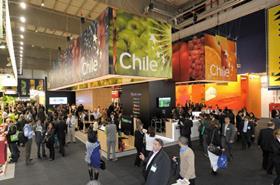
One year after the launch of the brand Fruits from Chile, and its sub-brands, at Fruit Logistica 2012, key importers and distributors worldwide agree that the campaign has helped to depict a sector with a united vision and strengthen the positive perception of the Chilean fruit industry, while reflecting significant progress in efforts to promote the sector.
Through a perceptions survey conducted among industry leaders, 75 per cent of respondents, comprising importers and distributors in various markets in which the generic brand was present, considered that the implementation of the sector brand was positive, according to a press release from the Chilean Fruit Exporters Association (Asoex).
They said they had seen it at international fairs and in specialised trade media, with 65 per cent of those surveyed stating that the new brands had helped to change the perception of the Chilean fruit industry in a favourable way.
Ronald Bown, president of Asoex, said the initiative has allowed Chile to disseminate not only its products but also the values associated with them.
“Chile will continue to invest in the training of our workers as well as the implementation of innovation throughout our production process to improve our industry’s competitiveness whilst stimulating research and development into new varieties of fruit that will broaden our offer and also help to expand in to new markets,” Bown explained.
Although there was a 2.1 per cent drop in global shipments of Chilean fresh fruit to 2,591,620 tonnes in 2011/12, Asoex said the sector has focused its promotion strategy in different markets to continue to build relationships and loyalty with importers and distributors.
Within Europe, Fruit Logistica has played a “fundamental” role in Chile’s penetration of the market and in the generation of contacts to open new business opportunities in other countries, according to Felix de Vicente, director of ProChile.
Europe accounts for 25 per cent of Chile’s fresh fruit export crop, totalling some 650,779 tonnes in 2011/12.
The main direct export markets were the Netherlands (the port of entry into Europe) with 237,571 tonnes; the UK with 110,976 tonnes; Russia with 89,151 tonnes, Spain with 59,051 tonnes, Italy with 56,119 tonnes and Germany with 22,985 tonnes.



